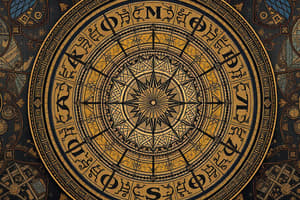Podcast
Questions and Answers
What is the earliest known number system?
What is the earliest known number system?
- Tally Marks (correct)
- Babylonian Numerals
- Hindu-Arabic Numeral System
- Roman Numeral System
Who introduced the concept of place value in number systems?
Who introduced the concept of place value in number systems?
- Euclid
- Pythagoras
- Fibonacci
- The Babylonians (correct)
What is the base of the Babylonian numeral system?
What is the base of the Babylonian numeral system?
- Base-100
- Base-20
- Base-10
- Base-60 (correct)
Who introduced the concept of irrational numbers?
Who introduced the concept of irrational numbers?
Who introduced Arabic numerals to Europe?
Who introduced Arabic numerals to Europe?
What is the name of the famous work that introduced the concept of proof and the development of geometry?
What is the name of the famous work that introduced the concept of proof and the development of geometry?
Who developed the decimal (base-10) system and introduced the concept of zero?
Who developed the decimal (base-10) system and introduced the concept of zero?
What is the time period associated with the ancient Greeks' contributions to number theory?
What is the time period associated with the ancient Greeks' contributions to number theory?
Flashcards are hidden until you start studying
Study Notes
Overview
The history of numbers spans thousands of years, with various civilizations contributing to the development of number systems.
Early Number Systems
- Tally Marks (30,000 BCE): The earliest known number system, used by ancient civilizations such as the Sumerians and Egyptians. Tally marks were used to count and record quantities.
- Babylonian Numerals (1800 BCE): The Babylonians developed a sexagesimal (base-60) system that used wedge-shaped characters. This system introduced the concept of place value.
Ancient Greek Contributions
- Pythagoras and the Pythagoreans (500 BCE): The ancient Greeks made significant contributions to number theory, including the concept of irrational numbers and the discovery of the infinitude of prime numbers.
- Euclid's Elements (300 BCE): Euclid's famous work introduced the concept of proof and the development of geometry, which laid the foundation for modern number systems.
Development of the Hindu-Arabic Numeral System
- Indian Contributions (500 CE): Indian mathematicians, such as Aryabhata and Brahmagupta, developed the decimal (base-10) system and introduced the concept of zero.
- Arabic Numerals (800 CE): The Arabs adopted and refined the Hindu numeral system, introducing the concept of the decimal point and the use of Arabic numerals (0-9) that are used today.
European Middle Ages and Renaissance
- Fibonacci's Introduction of Arabic Numerals (1200 CE): The Italian mathematician Fibonacci introduced Arabic numerals to Europe, replacing the Roman numeral system.
- Renaissance Mathematicians (1500 CE): Mathematicians such as Luca Pacioli and Niccolò Tartaglia made significant contributions to number theory, including the development of algebra and the concept of imaginary numbers.
Modern Developments
- Development of Real and Complex Numbers (1600 CE): Mathematicians such as René Descartes and Isaac Newton developed the concept of real and complex numbers, leading to significant advances in mathematics and physics.
- Development of Non-Integer Numbers (1800 CE): Mathematicians such as Augustin-Louis Cauchy and Bernhard Riemann developed the concept of non-integer numbers, including irrational and transcendental numbers.
Early Number Systems
- Tally marks, the earliest known number system, emerged around 30,000 BCE and were used by ancient civilizations such as the Sumerians and Egyptians.
- The Babylonians developed a sexagesimal (base-60) system around 1800 BCE, introducing the concept of place value using wedge-shaped characters.
Ancient Greek Contributions
- Pythagoras and the Pythagoreans made significant contributions to number theory around 500 BCE, including the concept of irrational numbers and the discovery of the infinitude of prime numbers.
- Euclid's Elements, written around 300 BCE, introduced the concept of proof and developed geometry, laying the foundation for modern number systems.
Development of the Hindu-Arabic Numeral System
- Indian mathematicians, such as Aryabhata and Brahmagupta, developed the decimal (base-10) system and introduced the concept of zero around 500 CE.
- The Arabs adopted and refined the Hindu numeral system around 800 CE, introducing the concept of the decimal point and the use of Arabic numerals (0-9).
European Middle Ages and Renaissance
- Fibonacci introduced Arabic numerals to Europe around 1200 CE, replacing the Roman numeral system.
- Renaissance mathematicians, such as Luca Pacioli and Niccolò Tartaglia, made significant contributions to number theory, including the development of algebra and the concept of imaginary numbers.
Modern Developments
- Mathematicians such as René Descartes and Isaac Newton developed the concept of real and complex numbers around 1600 CE, leading to significant advances in mathematics and physics.
- Mathematicians such as Augustin-Louis Cauchy and Bernhard Riemann developed the concept of non-integer numbers, including irrational and transcendental numbers, around 1800 CE.
Studying That Suits You
Use AI to generate personalized quizzes and flashcards to suit your learning preferences.




